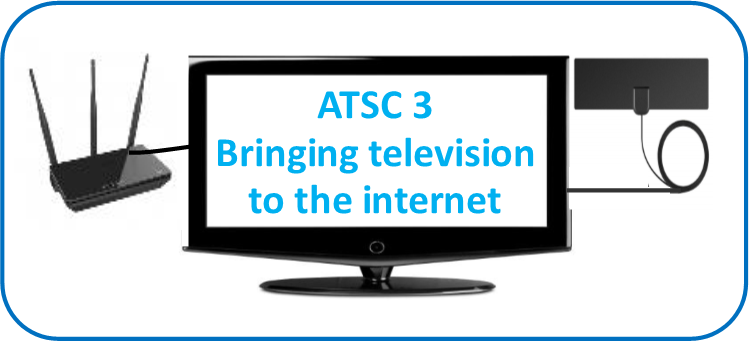
|
A T S C 3 ( Next Gen TV) broadcast standards coming to a TV near you |
|---|
|
ATSC 3.0 is a set of digital TV broadcast
standards that combines Over-the-Air (OTA) TV broadcast signals
with the internet.
In English the above means that ATSC 3 TV
signals will be available to television sets, smartphones and
internet connected devices. For television it brings
an internet connection along with greatly
enhanced audio and video to your
television.
For smartphones, it will bring free over-the-air
(OTA) television directly to the smartphone without using a cellphone data plan. These new ATSC 3 (ATSC = Advanced Television Systems Committee) broadcast standards are not backward compatible with previous TV and cellphones. In May 2023 smartphones do not have the electronics to receive this new format. Television sets are just beginning to install ATSC 3 tuners in their sets. LG, Samsung, Sony, and Hisense are leading the way with the most models with an ATSC 3 tuner installed.
To clarify, this only affects viewers that receive their TV programs over-the-air with an
antenna. Cable and satellite connected TV viewing won't be
affected, as those companies will make the technical standards
change for your TV, just as they did when TV technology changed
from analog to digital some years back.
Features in new technology often are looked
at guardedly. This will certainly be the case with ATSC 3 as it
becomes more of a mainstream topic in 2023-24 as the public
understands that the internet connection is two-way. The local
TV broadcasters will know what channel the TV set is tuned to
and what commercials have been presented. This is similar to Google and
Facebook targeted advertising where commercials are based on
which websites you visit.
The new standards allow local TV stations to
target TV commercials based upon a family's TV and internet
viewing. Targeted TV commercials viewed by Mr. T Viewer's family
could be different than what their neighbors are watching, even
when both families are viewing the same program.
Some people see this as an attack on privacy.
Others believe the commercials will be of more interest to the
family since the commercials could reflect their lifestyle choices. Looking at the technology side, features include 4K Ultra HD with High Dynamic Range (HDR). Previously sets produced a display of 1080 pixels (tiny dots on the screen that make up the picture) on average. The new standard, referred to as 4K, is double that number. Twice as many "dots" on the screen will produce a sharper picture. The range of different shading between pure black and pure white is enhanced (HDR). This will allow better contrast and ensure subjects in shadows and darker scenes are more clearly presented.
There will be better reception and more
TV channels per city providing more programs without cable or
satellite connections. You will also be able to watch TV on your
smart phone, tablet, and computer.
Next Gen TV (ATSC 3) can provide a signal to
moving cars enhancing car navigation systems and rear-seat
entertainment.
The new specifications call for the TV
program audio to meet Dolby AC-4 standards providing
high-quality audio and multiple language choices (SAP).
Earlier we mentioned better TV reception from
Over-The-Air TV stations. ATSC 3 provides a signal that is
stronger than previous broadcast transmissions. The TV signal will
travel farther and will reach deeper
into your home for a better, more stable picture.
Of course, the programs will have to be
produced with these specifications for the TV stations to
broadcast these signals. Some shows today are being produced in
4K, as streaming channels can already send this format to
viewers. TV manufacturers have begun selling 4K TV sets so
viewers may enjoy the new format.
8K video standards are also discussed within the ATSC 3
structure. While there are several 8K TV sets on the
market, I do not believe we will see OTA TV shows broadcast
in 8K for a few more years to come.
The Advanced Emergency Alerts feature will
provide live video updates, weather warnings, escape route maps,
and other detailed location-based information Unlike the transition from analog to digital TV we experienced a dozen years ago, there is no specific date set by the FCC for TV broadcasters to switch to ATSC 3. TV stations have already begun broadcasting in ATSC 3, with other locations converting within a year or two. The FCC requests all US TV stations to be speed up the conversion at those sites that have not already converted. Fortunately, the FCC, requires any TV station changing to ATSC 3, to also continue broadcasting in the previous ATSC format for at least five years. This means Over-The-Air TV viewers won't have to purchase any new TV sets or associated equipment quickly.
We'll have to wait and see how the broadcast
TV station owners respond to ATSC 3. This will be another
expensive investment for them. Some station owners might delay,
others have already made the conversion and are running
shows on both the current ATSC format and the newer ATSC 3
for their viewers.
Thousands of cable/satellite subscribers each year cancel their subscriptions and join the movement of people using a housetop TV antenna and streaming their TV programs through the internet.
Many
television station owners believe ATSC
3 will bring their local stations back into the TV game, by allowing
consumer-based advertising and more channels providing more
programs - all for no monthly fee to the viewer. Interested in seeing what cities the TV stations have already switched to to ATSC 3 ? CLICK the line below to leave this site and view the Watch Next Gen TV website.
|
|
CLICK TO RETURN TO TOP OF THIS PAGE
|